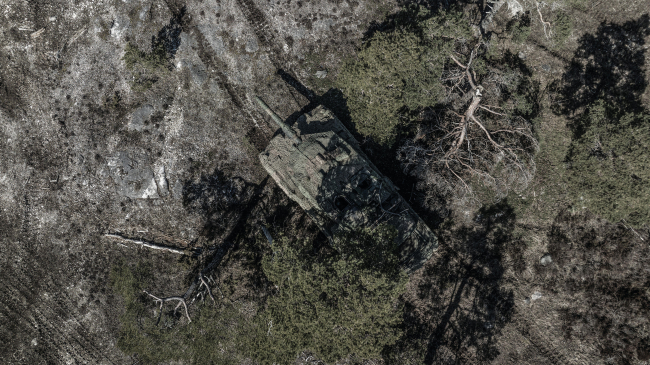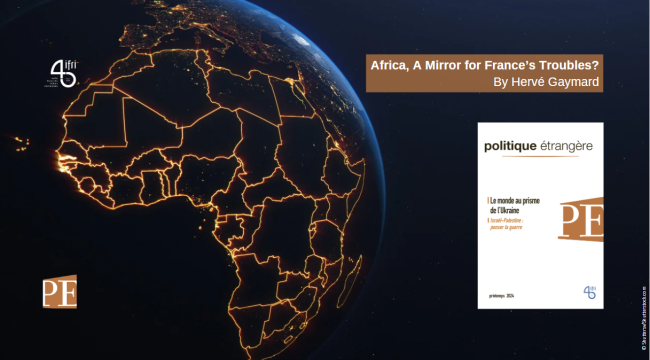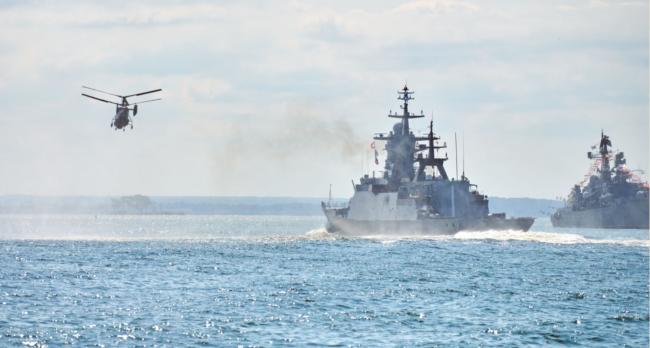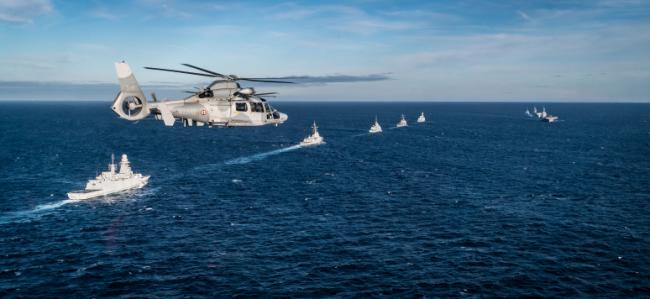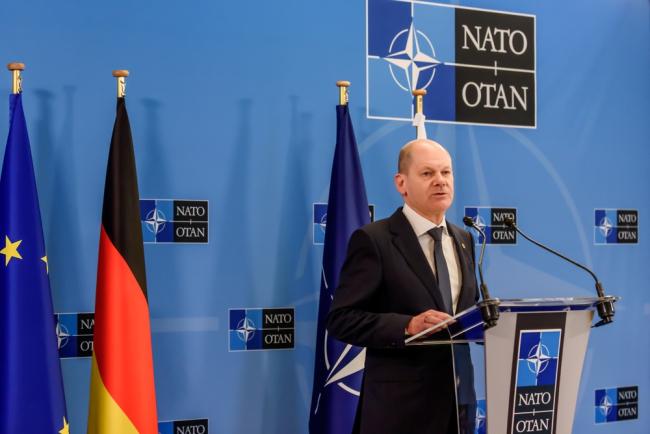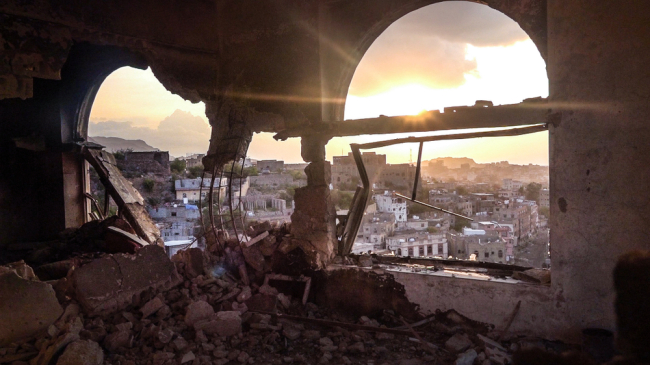Return to the East: the Russian Threat and the French Pivot to Europe's Eastern Flank
Russia’s full-scale invasion of Ukraine on February 24, 2022, has flung Europe’s Eastern flank into a new phase of strategic confrontation. It has had a major effect on France’s position, which was previously somewhat timid, leading it to significantly reinforce its deterrence and defense posture in support of the collective defense of Europe, in the name of strategic solidarity and the protection of its security interests.
“At the Other Side of the Hill”: The Benefits and False Promises of Battlefield Transparency
Recent conflicts have highlighted a key characteristic of contemporary warfare, unprecedented in its scale and impact on the conduct of operations: “battlefield transparency”.
Africa, A Mirror for France's Troubles?
France's setbacks in the Sahel should not lead it to forget the long-standing historical ties that bind it to many African countries.

The World Through the Lens of Ukraine
This issue of Politique étrangère looks at three conflicts currently unfolding around the world.
Russia’s New Challenges in the Baltic/Northern European Theater
The long war in Ukraine has brought a drastic geopolitical reconfiguration of the Baltic theater and a deep shift in the military balance between Russia and the North Atlantic Treaty Organization (NATO).
High-Intensity Warfare: What Challenges for the French Armed Forces?
The new French Military Programming Law for 2024-2030 resolutely commits the French armed forces to the path of high intensity. However, this term continues to be the subject of debate and confusion within the defense community.
Rebooting the Entente: An Agenda for Renewed UK-France Defense Cooperation
The Franco-British Summit on March 10th, 2023, will mark a much-needed reset in bilateral cooperation, following years of strained relations. With a recently re-elected French president and a new British Prime minister, both sides are committed to making this summit a success and re-launching a positive agenda for bilateral cooperation. The summit, the first since Sandhurst in 2018, will focus on three key topics: migration, energy, and foreign policy. Defense cooperation will also be addressed, as it remains the cornerstone of the bilateral relationship, though it may take a less prominent part than on previous occasions.
Naval Combat Redux: A Renewed Challenge for Western Navies
Our world is becoming increasingly contested and unpredictable and we are trending towards a return of great power strategic competition, characterized by more frequent challenges to the established rules-based international order. As a consequence, the risk of interstate conflict continues to rise. This regressive evolution is most readily apparent in the maritime domain, where the concomitant impacts on the free flow of international trade and the control of illegal and unregulated fishing are interlaced with the prescient, yet growing challenge of environmental security.
Germany, the “Zeitenwende” and the Future of NATO
Chinese Nuclear Force Modernization and Doctrinal Change
Dating back to the first test in 1964, the Chinese nuclear force modernization process is motivated by other nuclear powers’ modernization across the years, mostly from the United States and the Soviet Union, but also by domestic factors such as economic debates and tensions in the scientific community.
“At the Other Side of the Hill”: The Benefits and False Promises of Battlefield Transparency
Recent conflicts have highlighted a key characteristic of contemporary warfare, unprecedented in its scale and impact on the conduct of operations: “battlefield transparency”.
Chinese Nuclear Force Modernization and Doctrinal Change
Dating back to the first test in 1964, the Chinese nuclear force modernization process is motivated by other nuclear powers’ modernization across the years, mostly from the United States and the Soviet Union, but also by domestic factors such as economic debates and tensions in the scientific community.
Prospects for the New EU Strategy on India: Game Changer or Business as Usual?
The new European Union (EU) strategy on India marks a major moment of departure in EU-India relations.
The Future of Urban Warfare in the Age of Megacities
Urbanization is a relentless trend, and as cities grow and expand, armed conflict and violence are urbanizing as well.
The Return of Robert Gates
The memoirs of public men are exercises in self-promotion and self-justification. They are designed to etch a portrait of the (wo)man that will live across time. It's the legacy thing. These days, that legacy pertains also to the "here and now" since memoirs are not necessarily the conclusion of a career but rather the curtain-raising on its next act.
The intervention in Mali: Weimar Triangle Analyses: French, Polish and German viewpoints on European questions
On an initiative of the German Council of Foreign Relations (DGAP), the Study Committee for Franco-German Relations (Cerfa) of the French Institute of International Relations (IFRI) and the Polish Institute of International Affairs (PISM) are regularly publishing short contributions on a common subject, written by three experts of these institutes. The purpose of these “Weimar Triangle Analyses” is to give the French, Polish and German views on central questions of European politics and European integration.
The Battle over Fire Support: The CAS Challenge and the Future of Artillery
Traditionally, maneuver units are designed for mobility and control of the ground, while supporting forces (artillery, aviation) deliver fires to protect the former and ensure their freedom of action.
Toward the End of Force Projection? II. Operational Responses and Political Perspectives
For more than a decade, US defense circles have been concerned about the emergence of capabilities and strategies, which, as they spread, risk imperiling the United States" position in the world by their ability to disrupt or prevent force projection operations. Though most of the literature on such “anti-access” strategies focuses on the military aspects of the threat, this Focus stratégique - the second and last part of a two-part study - adopts a different perspective.
Toward the End of Force Projection? I. The Anti-Access Threat
Force projection has become a general posture and a fundamental dimension of the influence Western powers intend to exert over the world by means of their armed forces.
Strategic Stability in the Cold War: Lessons for Continuing Challenges
During the Cold War, the phrase “strategic stability” gained currency both as a foreign policy objective and as an apt way of describing the fact that the United States and the Soviet Union never actually went to war.
Support independent French research
Ifri, a foundation recognized as being of public utility, relies largely on private donors – companies and individuals – to guarantee its sustainability and intellectual independence. Through their funding, donors help maintain the Institute's position among the world's leading think tanks. By benefiting from an internationally recognized network and expertise, donors refine their understanding of geopolitical risk and its consequences on global politics and the economy. In 2025, Ifri supports more than 80 French and foreign companies and organizations.









